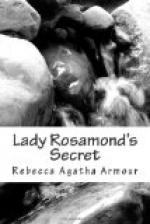As I intend very soon to write you something of a livelier description, I now conclude this hastily-written scribble. Dearest, I expect to hear from you all immediately. Gerald is rapidly improving, and is sanguine of ultimate recovery. Adieu. From
Your Rosamond.
Lady Rosamond now entertained hopes of her husband’s recovery. He seemed much stronger and took a deeper interest in their explorations. In the company of English friends he visited all the accessible spots of historic ground. Lady Rosamond was always ready to encourage him by her hopeful remarks and winning smile. She had formed an attachment to the lovely Mabel Crofton, who indeed repaid her in a fond return.
Nothing gave Gerald Bereford more anxiety than the pale face of his wife. In his feeble health he strove to draw her ladyship’s attention towards the social circle with a view to raise her occasional drooping spirits.
In the young English maiden Lady Rosamond found much company. They conversed much and enjoyed the sights together with united regard and interest.
In answer to a lengthy letter received shortly afterwards from Mary Douglas, the following was penned by Lady Rosamond:
Rome, April 15th, 1831.
My Darling Mary:
Truly did you respond to my wishes. How can I ever repay so much devotion? You have indeed granted my requests in mentioning all my friends, and giving all the matter which interests Gerald so much. He is indeed truly grateful and is going to write you by next mail. His health has not been improving so rapidly of late, yet we have every hope of his recovery. Will it not be a happy moment when we meet again on the shores of dear old England? The very dust and fog will have a charm hitherto unknown.
As we are in Rome you will expect something from Rome, therefore I will tell you of what has recently been going on. Last week was the Carnival. Gerald complained of weakness and fatigue, having exerted himself too much during the previous week. He was much disappointed in not being able to participate in the amusement, but had to be satisfied by remaining on the balcony of our residence, overlooking the Corso, which, as you know, is the principal street paraded on those occasions. Gerald interrupts me by requesting a long letter and full description, therefore on him alone rests the blame if I exceed the length usually devoted to letter writing.
Now for the Carnival. At an early hour on Monday morning the usual bustle and active preparations commenced. Carriages rolled along laden with confectionaries and flowers. In fact the street, houses, and passing vehicles of every description, appeared as though the heavens had literally rained flowers—flowers showered in every direction. Evidently we were certain that flowers were to be one of the prominent features witnessed in the grand demonstration.




